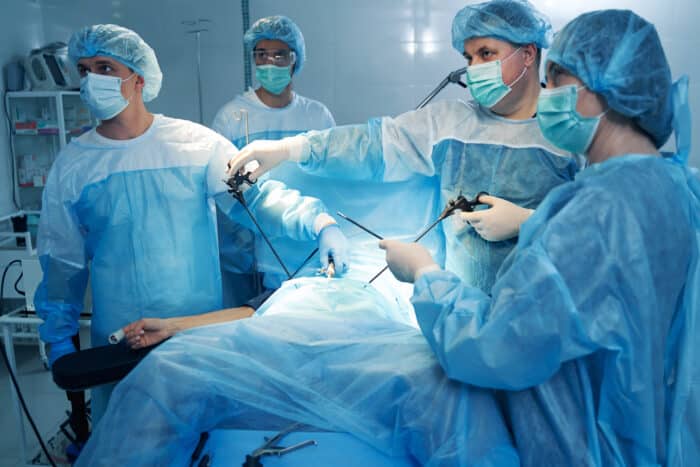Surgical Techs play a crucial role in the operating room, ensuring surgeries run smoothly and patients receive the best care possible. To become one, you need to go through a formal education and get certified.
You must have known this by now and must have been convinced to enroll in a Surgical Tech program but are wondering about the challenges you might come across during the program.
To be fair, just like any career program this career program offers many rewards but comes with its own set of challenges.
So, in this article, we are going to break down exactly all of that just to ease your nerves and help you develop an understanding of the challenges you might face during the program.
Let’s start –
Challenges You Face During the Surgical Tech School
To become a surgical tech, you’ll need to complete a surgical tech program. These programs can vary in length, but the online programs are relatively short compared to a traditional two-year degree. That’s why we recommend online programs.
However, it’s up to you to choose between an online, certificate program or an associate degree program. Whatever you choose there are a few challenges you might face.
Read:
-> What Does a Surgical Tech Do?
-> How to Become a Surgical Tech?
Let’s delve into the reasons behind the potential difficulty of these programs –
Demanding Curriculum
Surgical tech programs cover a wide range of subjects, from anatomy, physiology, pharmacology, sterile techniques, and medical terminology to surgical procedures. This comprehensive curriculum can be challenging, as it requires you to absorb a significant amount of medical knowledge in a relatively short period.
Hands-On Training
One of the unique aspects of surgical tech education is the hands-on training. You’ll practice in simulating operating rooms, learning to handle surgical instruments, and assisting surgeons effectively. This practical experience is crucial for your future career but can be demanding and stressful.
Clinical Rotations
During your training, you’ll participate in clinical rotations at actual healthcare facilities. While these rotations provide invaluable experience, they can also be physically and mentally taxing. You’ll be working alongside healthcare professionals in real surgical settings, where the pressure to perform is relatively higher.
Balancing Act
The juggling act of managing coursework, hands-on training, and clinical rotations can be intense. You’ll need excellent time-management skills to meet all your obligations successfully. Additionally, many students work part-time jobs to support themselves, adding another layer of complexity.
What’s the Difficulty Level?
To be honest, the difficulty level varies among students and their educational background, and obviously, the program they are enrolled in.
For instance, a student undergoing an on-campus associate degree would face more trouble than a student undergoing an online program.
But you can absolutely negotiate the challenges with your dedication and passion for the. Remember, to stay organized, keep up with the coursework, and seek help when needed.
You May Also Like:
-> Surgical Tech Certification
-> How to Become a Certified Surgical Tech?
-> Can You Be a Surgical Tech Without Certification?
Challenges You Face till You Become an Established CST
Becoming a Certified Surgical Technologist (CST) is a rewarding journey, that can open doors to a fulfilling career in healthcare. But the road to becoming an established CST can be demanding.
However, the rewards of this profession, including a fulfilling career in healthcare and opportunities for personal and professional growth, make the journey worthwhile.
Let’s delve into the challenges you may face on this journey –
Educational Hurdles
As discussed earlier, your journey begins with enrolling in a surgical tech program. These programs are designed to provide you with the knowledge and skills required to excel in the operating room.
However, the curriculum can be challenging, covering a broad spectrum of medical topics. You’ll need to dedicate significant time and effort to absorb this information effectively.
Clinical and Practical Experience
Surgical technology is a hands-on profession. During your training, you’ll engage in clinical rotations and practical experiences. While these opportunities are vital for your growth, they come with challenges. You might encounter unfamiliar surgical procedures, high-pressure situations, and the need to adapt quickly.
Certification Exam
The CST credential is a significant milestone in your journey. To earn it, you’ll need to pass the NBSTSA or NCST certification exam. This exam is rigorous and requires extensive preparation. Many aspiring CSTs find the challenge of studying for this test to be one of the most significant hurdles.
Maintaining Certification
Once you’ve earned your CST credential, the journey doesn’t end there. You must work to maintain your certification by completing continuing education (CE) requirements. Meeting these CE standards can be demanding as you balance them with your professional responsibilities.
Keeping Up with Advancements
The medical field is constantly evolving with new surgical techniques, instruments, and technologies. As an established CST, you’ll need to keep up with these advancements to provide the best care for your patients. Staying current in this ever-changing environment can be challenging.
Workplace Pressures
In the operating room, you’ll face demanding situations that require quick thinking and adaptability. Surgical techs often work under high stress, and the pressure to ensure the surgery goes smoothly is substantial.
Physical and Mental Stress
Surgical techs often spend extended periods on their feet during surgeries. This physical aspect of the job can be demanding, requiring good physical health and stamina. Additionally, witnessing surgeries and dealing with medical emergencies can be emotionally taxing.
Read More:
How Can You Avoid the Challenges?
Becoming a Certified Surgical Technologist (CST) is certainly not a walk in the park. The path is filled with challenges. But adopting these strategies can help you negotiate them successfully, and make a meaningful impact on patient care.
Let’s discuss how to avoid and overcome these challenges –
Choosing the Right Training
The first step is selecting the right surgical technology program that sets the foundation for your career. Ensure that you choose an online accredited program with a comprehensive curriculum and experienced instructors. Prioritize programs that offer practical hands-on training and prepare you to excel in clinical settings.
Read More:
-> Online Surgical Tech Programs
-> Surgical Tech Classes & Courses
-> Surgical Tech Program & Training
Acquiring Clinical Experience
As a surgical technologist, gaining practical experience is very essential. During your clinical rotations, make the most of every opportunity to assist in surgeries, handle instruments, and work alongside seasoned professionals. The skills and knowledge you acquire here are invaluable.
Preparing Well for Certification
To become a CST, you need to pass the certification exam. Prepare effectively by using certified study materials, taking practice exams, and joining study groups. Start your preparation well in advance, focusing on all exam domains. Create a study schedule and stay committed to your goal.
Choosing the Right Certification
Certification is the deciding factor for your career. Selecting the right certification is crucial. The Certified Surgical Technologist (CST) certification through the NBSTSA or NCST by AAH is the most widely recognized. Ensure that the certification aligns with your career goals and is respected in the field.
Joining AST Membership
It might sound awkward, but joining a professional organization can help you a lot to shape your career. You must consider becoming a member of the Association of Surgical Technologists (AST).
Membership provides access to valuable resources, networking opportunities, continuing education, and support from a professional community. It’s a great way to stay informed about industry advancements and connect with fellow CSTs.
Also Read:
Is Surgical Tech School Harder Than Nursing?
When it comes to choosing a healthcare career path, you might wonder whether surgical tech school is harder than nursing. Both fields have their unique challenges, and what you find more difficult can depend on your strengths, interests, and career goals.
Let’s delve deeper –
Course Duration
Surgical tech programs are shorter and more specialized, making them appealing to those who want to work in surgical settings.
Nursing programs are often longer, with options ranging from associate degrees in nursing (ADN) taking about 2-3 years, to bachelor of science in nursing (BSN) programs taking 4 years.
Curriculum Complexity
Surgical Tech programs cover a specialized set of topics, they are generally more focused on surgical procedures, aseptic techniques, and the use of surgical instruments.
Nursing education is more comprehensive, encompassing a broader range of medical and patient care topics, including pharmacology, anatomy, physiology, and clinical rotations.
Licensing and Certification
Surgical Tech graduates can pursue certification as a Certified Surgical Technologist (CST) through NBSTSA or NCST. But is not mandatory.
Nursing graduates must pass the NCLEX-RN or NCLEX-PN examination to become licensed registered nurses (RN) or licensed practical nurses (LPN).
Scope of Practice
Surgical Techs work closely with surgeons in the operating room, ensuring that procedures run smoothly, maintaining sterile fields, and handling surgical instruments.
Nurses have a broader scope of practice, including assessing patients, administering medications, creating care plans, and providing holistic patient care.
Conclusion
The demands of the curriculum, the need for practical experience, clinical rotations, and the pressure of certification exams make this educational journey challenging. However, the rewards, including a fulfilling career and opportunities in the healthcare sector, make the hard work worthwhile.
So, if you’re passionate about healthcare and willing to put in the effort, you can successfully negotiate the difficulties of surgical tech school and achieve your goals.
Ultimately, Is surgical tech school hard? Yes, it can be. But if you are well prepared you can easily negotiate the challenges and enjoy the process till you become an established CST. Best wishes!
Related:
-> CVOR Tech
-> Scrub Nurse vs Surgical Tech
-> Surgical Tech vs Surgical Assistant
-> Pros And Cons Of Being A Surgical Tech
Related Articles
-
How to Be Successful in College in 2022 – 7 Simple Tips to Succeed
-
How Do Scholarships Work? Read This First…Truth is Shocking
-
7 Best College Majors 2024: What Should I Major In?
-
How to Choose a College – 10 Things You Must Consider in 2024
-
Why Go to College? Top 13 Benefits for Adult Students in 2022
-
Top 5 Best Alternatives to Community College for 2024









